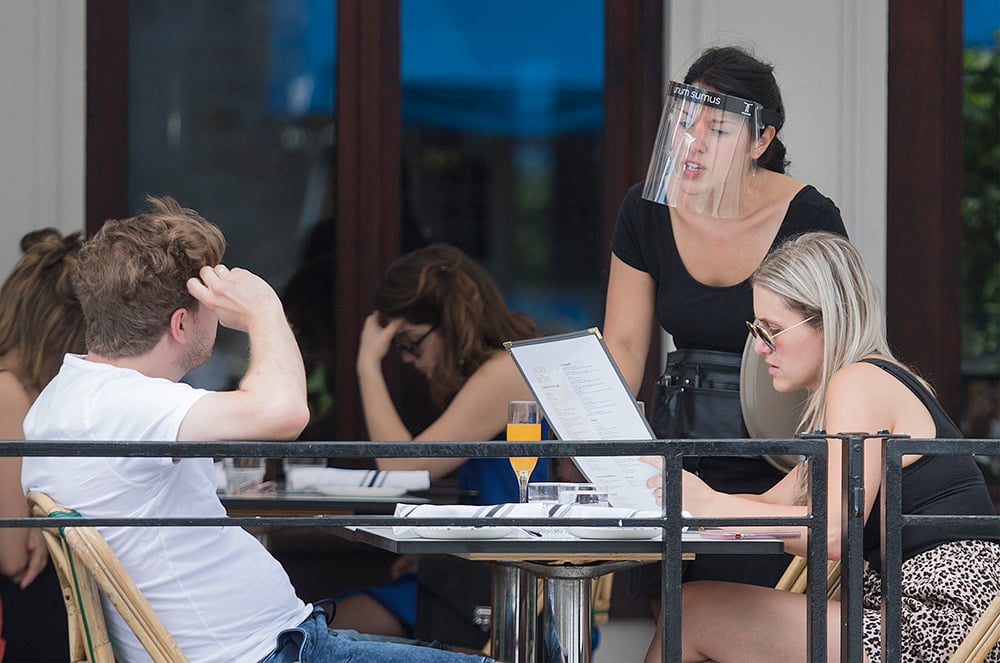Compiled by veteran medical journalist Brian Owens, this roundup of some of the newest science on the COVID-19 pandemic, straight from the scientific journals, is presented by Hakai Magazine in partnership with The Tyee.
Face shields and mask valves don’t stop the spread of COVID-19
With face coverings becoming more common — and mandatory in some places — many people are choosing to use clear plastic face shields or masks with exhalation valves instead of surgical or cloth masks. But researchers have shown that while face shields block the initial forward projection of a cough or sneeze, the droplets can easily move around the visor and spread out over a large area. Similarly, a mask equipped with an exhalation port allows a large number of droplets to pass through unfiltered, making it ineffective at stopping the spread of the virus.
Physics of Fluids, Sept. 1, 2020
Minimal mutations raise hopes for a universal vaccine
Genetic analysis of samples of SARS-CoV-2 from 84 different countries has shown that the virus has undergone few mutations since it was first identified in December 2019. The low level of variation means that a single, universal vaccine would likely be equally effective against all the strains currently in circulation.
Proceedings of the National Academy of Sciences, Aug. 31, 2020
Early results from Russian vaccine show promise
The first results from the Russian Sputnik V vaccine trial have shown some promise. Two versions of the vaccine induced antibodies in all participants and produced no serious side effects over 42 days. This was a small combined phase 1 and 2 trial, but the Russian government has already said it will begin using the vaccine without waiting for the results of large phase 3 trials, which are needed to confirm that the vaccine works as intended. But the study has attracted criticism from some scientists, who have pointed out potential problems with the data in an open letter.
Surgical backlog in Ontario will take more than a year to clear
The backlog of almost 150,000 surgeries in Ontario due to the COVID-19 pandemic will take an estimated 84 weeks to clear, with a target of 717 surgeries per week. In mid-March, the Ontario Ministry of Health directed Ontario hospitals to cancel elective surgeries and other non-emergency activities to help prepare for an anticipated surge in patients with COVID-19. That directive was lifted on May 26.
Canadian Medical Association Journal, Sept. 1, 2020
Steroids improve survival of critically ill COVID-19 patients
A series of studies has found that treating critically ill patients with corticosteroids like dexamethasone and hydrocortisone improves their chances of recovery. Steroids are anti-inflammatory drugs, and evidence suggests they reduce the lung inflammation seen in patients who are seriously ill and require oxygen support for their breathing difficulties. As a result, the World Health Organization is issuing new guidelines to include the use of steroids to treat critically ill COVID-19 patients.
Kids can have the virus and antibodies at the same time
With most viruses, once you start to detect antibodies in a person you will no longer see the virus itself. But a new study of SARS-CoV-2 in children has found both at the same time. It remains unknown, however, whether the virus is still transmissible, or whether the antibodies offer protection. The same study found that children under the age of 15 take longer to clear the virus from their system after infection than older children.
Journal of Pediatrics, Sept. 3, 2020
Hospitalization rates of kids similar between COVID-19 and flu, but long-term effects of COVID-19 can be severe
Researchers were surprised to find that there is no significant difference in the rates of hospitalization, admission to the intensive care unit, and mechanical ventilator use between children infected with COVID-19 and those with seasonal influenza. But another study has found that multisystem inflammatory syndrome in children, believed to be a potential complication of COVID-19, damages the heart to such an extent that some children will need lifelong monitoring and interventions, even if their initial illness was mild or asymptomatic.
JAMA Network Open, Sept. 8, 2020
EClinicalMedicine, Sept. 4, 2020

Vitamin D deficiency may increase risk of COVID-19
A study in Chicago has found that patients who had a vitamin D deficiency were almost twice as likely to test positive for COVID-19 compared with patients who had sufficient levels of the vitamin. Vitamin D is important to the function of the immune system, and vitamin D supplements have previously been shown to lower the risk of viral respiratory tract infections.
JAMA Network Open, Sept. 3, 2020
Does COVID-19 really cause a cytokine storm?
An immune system overreaction known as a cytokine storm is believed to be one of the harmful effects of COVID-19. But new research that measured the level of several cytokines in COVID-19 patients and compared them to other illnesses has found that cytokine levels were significantly lower in COVID-19 compared with other respiratory infections, and similar to conditions that are not generally associated with a cytokine storm.
Misinformation from credible sources has a bigger impact
Misinformation can have a huge impact when credible sources take part in spreading it, according to a study of the false claim that the anti-inflammatory drug ibuprofen could increase mortality among COVID-19 patients. Even though the claim originated in Germany, few people there took it seriously compared with France, where it had a huge impact after the health minister repeated it on Twitter, apparently giving it official backing.
Misinformation Review, Sept. 4, 2020 ![]()
Read more: Coronavirus, Science + Tech















Tyee Commenting Guidelines
Comments that violate guidelines risk being deleted, and violations may result in a temporary or permanent user ban. Maintain the spirit of good conversation to stay in the discussion.
*Please note The Tyee is not a forum for spreading misinformation about COVID-19, denying its existence or minimizing its risk to public health.
Do:
Do not: